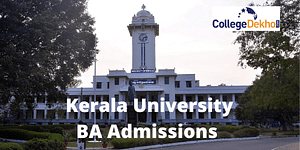MSW Course Syllabus & Subjects 2024
Master of Social Work Syllabus is divided into 4 semesters taught over two years. MSW syllabus consists of History and Philosophy of Social Work, Social Exclusion and Inclusive Policy, Social Problem and Social Development, Rehabilitation and Resettlement, Social Work Research and Quantitative Analysis, Ideology and Ethics of Social Work, Social Work Administration, Social Legislation and Labor Welfare, Corporate Social Responsibility etc, The syllabus aims to equip students with the knowledge, skills, and ethical foundation necessary to excel in diverse social work settings.
MSW Course Syllabus & Subjects Overview
MSW course syllabus is offered by colleges accredited by the University Grants Commission (UGC). The university designs the MSW course subjects based on the commission's curriculum guidelines. Based on the New Education Policy, the Ministry of Education will only accept MSW course syllabus and subjects designed with the Choice Based Credit System (CBCS). Therefore, you can get the course syllabus through the CBCS scheme. Students in the CBCS course structure are taught some core subjects that are common to all students. They can also select from a list of predetermined subjects known as electives or optional courses.
MSW course syllabus incorporates subjects such as Social Work, Psychology, Sociology, Human Rights, Social Development, etc. It is designed in a way to benefits society by allowing students to work for the betterment of people and the community as a whole. The Master of Social Work course is a two-year post-graduate course in the field of social work. MSW course subjects cover topics like Healthcare, Childcare, Psychology, Sociology, and so on. Along with core semester subjects, the course includes other specialisations for specific skill development. The course does not require an internship, but it does require extensive study and research throughout the course. For more information on the MSW course subjects and syllabus, including the semester-by-semester topics for all core and elective subjects under the CBCS programme, continue reading.
Table of Contents
- MSW Course Syllabus & Subjects Overview
- Revised MSW Course Syllabus
- MSW Course Year Wise Syllabus
- Stream Wise MSW Course Syllabus
- MSW Course Semester Wise Detailed Syllabus
- MSW Course Subjects in Detail
- MSW Course Common Subjects for All Semesters
- MSW Course Optional Subjects
- MSW Course Lab Subjects
- Specialisations Offered in MSW Course
- Syllabus for MSW Distance Programs
- MSW Course Entrance Exam Syllabus
- MSW Important Books
- MSW Course Structure
- FAQs about MSW Syllabus
Revised MSW Course Syllabus
Students must select an elective course from a list of options when enrolling in an MSW course. There are two elective subject schemes included in the MSW course curriculum: electives and open electives. Electives are only available to MSW students, but electives are open to both MSW students and students of other courses offered by the Department of Social Science.
Candidates must go over the MSW course structure followed by UGC-recognised colleges under the CBCS scheme before moving on to the list of MSW syllabus:
- There are 19 required papers for the two-year MSW course, including fieldwork practical
- There will be six core subjects each in the first and second semesters
- There are four core subjects in the third semester
- Three core subjects are included in the fourth semester
- Two elective subjects are offered in each of the third and fourth semesters of the two-year MSW course
- The third and fourth semesters of the course structure include four open elective subjects
MSW Course Year Wise Syllabus
The MSW syllabus is divided into core and elective subjects. They may differ depending on the university/ college. The MSW course syllabus aims to provide students with access to all important aspects of the curriculum. MSW syllabus is divided into two parts: a mandatory set of courses covering all foundation areas in literature and an elective set of courses aimed at developing job-specific skills and knowledge. The general MSW subjects over the four semesters have been provided below:
| Semester 1 | Semester 2 |
|---|---|
| History and Philosophy of Social Work | Social Exclusion and Inclusive Policy |
| Social Problem and Social Development | Rehabilitation and Resettlement |
| Social Work Research and Quantitative Analysis | Social Work Methods |
| Human Growth and Development | Visual Culture |
| Social Work Practical-I (Structured Experience Laboratory and Research Methodology Practical) | Social Work Practical-III (Concurrent fieldwork – Community Placement) |
| Social Work Practical-II (Skill Development Assessment) | Social Work Practical-IV (Learning Social Work through Participatory Approach) |
| IT in the Social Sector | Community Intervention and Entrepreneurship Development |
| Semester 3 | Semester 4 |
| Ideology and Ethics of Social Work | Social Work Administration |
| Social Legislation and Labor Welfare | Corporate Social Responsibility |
| Vulnerable Children and Their Development | Tribal Anthropology and Social Work |
| Elective-I | Elective-II |
| Social Work Practical-V (Concurrent fieldwork – Agency Placement) | Fundamentals of Medical Social Work |
| Social Work Practical-VI (Micro Level Study on Social Exclusion) | Block Field Work Placement |
Stream Wise MSW Course Syllabus
Despite the various types of specialisation available in the MSW Program, the MSW course syllabus remains the same except for one subject that candidates choose as a major MSW subject based on their specialisation.
In the Master of Social Work programme, students can choose from several specialisations, such as Family and Children's Welfare, Medical and Psychiatric Social Work, And Urban and Rural Community Development. Here is a quick overview of these specialisations:
Family and Child Welfare: This MSW course's subject specialisation teaches about matters about family and child welfare. Aspirants receive training to assist others in resolving these problems and maintaining a happy family life. They are also taught about family ethics, problem-solving methods etc. in this specialisation.
Medical and Psychiatric Social Work: This MSW course subject is a type of medical social work that involves supporting and caring for people who are mentally ill or require psychiatric guidance. Their job is to teach their clients how to deal with mental illnesses and to assist them in curing them.
Urban and Rural Community Development: This MSW course subject; Urban and Rural Community Development is a specialisation that teaches how to improve the life approach and standard of living of the underprivileged population. It also includes meeting the community's economic and non-economic needs.
Criminology Administration: This specialisation entails teaching to support family members affected by the actions of offenders. They also help survivors navigate the legal system from the time they report to trial and beyond.
MSW Course Semester Wise Detailed Syllabus
Below is the MSW detailed semester-by-semester syllabus.
MSW Course Syllabus: 1st Semester
Only core subjects are covered in the first semester of the MSW course. The following is the syllabus for these core subjects:
| First Semester MSW Course Subjects | Topics Covered |
|---|---|
| Social Work Education and Profession | Introduction to Social Work Profession |
| Historical Development of Social Work | |
| Social Work as a Profession | |
| Theoretical Perspectives for Social Work Practice | |
| Social Work with Individuals | Evolution and Development of Casework |
| Principles and Components of Casework | |
| Approaches to Casework Practice | |
| Process and Techniques of Social Casework in different settings | |
| Community Practice in Social Work | Understanding “Community” in Community Practice |
| Community Practice: Concept and Context | |
| Theories, Principles and Approaches to Community Practice | |
| Community Practice Models and Skills | |
| Community Practice- Paradigm Shift | |
| Sociological Concepts and Contemporary Concerns | Basic Concepts of Sociology |
| Introducing Indian Society | |
| Sociological Perspectives and Methods to Understand Social Issues | |
| Socialisation and Construction of Social Identity | |
| Contemporary Social Issues | |
| Psychology for Social Workers: Theories and Applications | Perspectives in Psychology |
| Individual in a socio-cultural environment | |
| Social self and communication | |
| Human Growth and Personality Development |
MSW Syllabus: 2nd Semester
The following is the MSW 2nd semester syllabus and subjects:
| Second Semester MSW Course Subjects | Topics Covered |
|---|---|
| Social Work with Groups | Understanding Social Groups |
| Social Group Work Method | |
| Group Work Process and Techniques | |
| Group Work in Social Work Practice | |
| Theoretical Approaches to Group Work | |
| Research in Social Work | Research Methods for Social Work |
| Research Design | |
| Data Collection and Management | |
| Basic Statistics | |
| Descriptive and Inferential Statistical Methods | |
| Social Justice & Human Rights in Social Work Practice | Dimensions of Social Justice and Human Rights |
| Marginalisation and Human Rights Issues | |
| Instruments of Social Justice and Protection of Human Rights | |
| National Institutions for Protection of Social Justice and Human Rights | |
| Social Work Practice for Social Justice and Human Rights Perspective | |
| State, Political Economy and Governance | State: Concept and Evolution, Structures and Institutions |
| Basic Political Concepts and Theories | |
| Political Economy, Democracy, Citizenship | |
| Governance: Meaning, Models and Determinants | |
| Self-Study/ Discussion Forums/Presentations | |
| Social Development | Social Development- Concept, Process and Strategies |
| Theories of Development | |
| Social and Economic Inequality | |
| Contemporary Development Thrust and its Impact | |
| Self-study and Assignments |
MSW Course Syllabus: 3rd Semester
The MSW course's third semester consists of six subjects: two core subjects, two electives, and two open electives. The third semester MSW syllabus is listed in the table below:
| Third Semester MSW Course Subjects | Topics Covered | |
|---|---|---|
| Core 1 | Administration of Welfare and Development Services | Welfare and Development Administration |
| Components of Administration | ||
| Communication in administration | ||
| Strategies and mechanisms of administration | ||
| Management of Human Service Organisations | ||
| Core 2 | Social Policy and Social Planning | Understanding Social Policy |
| Welfare state | ||
| Social Planning | ||
| Policy Analysis and Practice | ||
| Elective 1 (one subject to be chosen among the following) | Urban Community Development | Urban Communities and Urbanisation |
| Urban Poor | ||
| Urban Development Policies and Programmes | ||
| Emerging Concerns | ||
| Participation, Action and Advocacy | ||
| Social Work Practice in Mental Health | Understanding Mental Health | |
| Classification, Epidemiology and Manifestations of Mental Disorders | ||
| Mental Health Care Scenario | ||
| Social Work Interventions in Mental Health | ||
| Social Work with Families and Children | Understanding dynamics of family system | |
| Child Development: Issues and Challenges | ||
| Vulnerable children: policy and social work response | ||
| Family problems & social work response | ||
| Corporate Social Responsibility & Social Entrepreneurship | Management of Social Enterprises | |
| Social Entrepreneurship: Concept and context | ||
| Corporate Social Responsibility: Action and Environment | ||
| Corporate Social Responsibility: Concept and Context | ||
| Elective 2 (one subject to be chosen among the following) | Criminal Justice Social Work | Crime, Victimology and theories of Crime |
| Social Defence and Correctional services | ||
| Criminal Justice System and Legislation | ||
| Juvenile Justice | ||
| Conflict Mitigation and Peace Building | Basic Concepts Related to Conflict | |
| Conflict Analysis and Strategies for Social Work Intervention | ||
| Peace Building: concepts, analysis and models | ||
| Peace building: Strategies and Interventions | ||
| Counselling: Theory and Practice | Introduction: Foundations and Approaches to Counselling | |
| Counselling: Techniques, skills, competencies and therapeutic relationship | ||
| Counselling Practice in Different Settings | ||
| Counselling practice - Application of psychosocial Perspective | ||
| Management of Human Resources | Human Resource Functions: Theory and Practice | |
| Developing Human Resources | ||
| Organisational Behaviour | ||
| Legal Base for Practice | ||
| Open Elective 1 | Information Communication & Technology for Social Work Practice | Understanding the importance, the of ICT in Social Work |
| Technology for Change: Legislations, Policies and Programmers | ||
| ICT for empowerment of vulnerable constituencies | ||
| ICT and Social Work Practice: Skills and Case Studies | ||
| Open Elective 2 | Indigenous Communities and Development Discourse | Introduction to Indigenous Communities |
| Indigenous peoples Issues and Challenges | ||
| Social Work Practice skills and Policy Responses | ||
MSW Course Syllabus: 4th Semester
The MSW course's fourth semester consists of six subjects: two core subjects, two electives, and two open electives. The fourth semester MSW syllabus is listed in the table below:
| Fourth MovementsSemester MSW Course Subjects | Topics Covered | |
|---|---|---|
| Core 1 | Social Action and Social movements | Social Action: Concepts and Strategies |
| Guiding Ideologies /Philosophies of Social Action | ||
| Social Movements: Ideology, Theory and Participation | ||
| Social Movements: Nature and Typology | ||
| Social Action in Practice | ||
| Core 2 | Social Legislations & Social Work | Social Legislation: Contextual Background |
| Social Legislation for Marriage and Family | ||
| Social Legislation for Women | ||
| Social Legislation for Children | ||
| Social Legislation for Weaker Sections and Special Groups in India | ||
| Practice Assignments | ||
| Elective 1 (one subject to be chosen among the following) | Social Work Practice in Health setting | Public Health in India |
| Healthcare Social Work and Community Health | ||
| Healthcare Services and Programmes | ||
| Environment, Sustainable Development and Social Work | Environment and Social Work: Inter-linkages | |
| Sustainable Development: Interface between Environment and Development | ||
| State of the Environment and Environmental Conservation | ||
| Environmentalism: Approaches, Movements and Action | ||
| Social Work with Older Persons | Old age: concept, dynamics and vulnerabilities | |
| Needs and problems of older persons | ||
| Policies and programmes for Active ageing | ||
| Gerontological social work practice | ||
| Gender and Development | Conceptualising Gender | |
| Manifestations of Gender Disparity | ||
| Gender Perspectives in Development | ||
| Mechanisms Addressing Issues and Best Practices | ||
| Elective 2 (one subject to be chosen among the following) | Social Work and Disaster Management | Conceptual Framework: Disaster, Vulnerability and Risk |
| Disaster Governance | ||
| Community-based Interventions (Preparedness and Response) | ||
| Psychosocial Care of Survivors | ||
| Occupational Social Work | Occupational social work: Concepts and Scope | |
| Workers in the organised sector: Issues and challenges | ||
| Working Conditions and Conditions of Work | ||
| Workers in Unorganised Sector | ||
| Emerging Issues and Concerns for Occupational Social work | ||
| Social Work with Persons with Disabilities | Disability: Concept, Nature, Definitions and Model | |
| Disability Issues, Problems and Responses | ||
| Policy, Legal Framework, Services and Programmes | ||
| Rehabilitation of Persons with Disability | ||
| Assistive Technology and Disability | ||
| Rural Community Development | Understanding Rural Communities | |
| Rural Livelihoods, Poverty and Contemporary Concerns | ||
| Rural Community Development: Approaches and Interventions | ||
| Rural Development Policies and Programmes | ||
| Open Elective 1 | Child Rights and Action | Children and Their Needs |
| Legal and Administrative Framework for Care and Protection of Children | ||
| Child Rights Practice: Strategies, stakeholders and mechanisms | ||
| Open Elective 2 | Social Work Practice with PLHIV | Social Dimension of HIV/AIDS |
| Prevention Strategies, Care and Support for PLHA | ||
| HIV/AIDS and Policy Issues | ||
| HIV/AIDS and Social Work Interventions | ||
MSW Course Subjects in Detail
Though they vary according to the course module offered by a respective institute, the MSW subjects are essentially similar in all of them. Nonetheless, depending on the teaching style, the MSW course subjects are delivered in a different order even though they are generally relatively comparable. Candidates who complete the programme will learn a novel approach to child care, nursing, health, etc. The following table covers some important MSW subjects in detail along with their respective topics covered.
| Subject Name | Included Topics |
|---|---|
| History of Social Work |
|
| Human Growth and Development |
|
| Rehabilitation and Resettlement |
|
| Social Legislation and Labour Welfare |
|
| Social Work Administration |
|
| Social Work Research |
|
MSW Course Common Subjects for All Semesters
As discussed, the MSW syllabus is created in compliance with the Ministry of Education's curricular guidance. It offers a thorough grasp of social work in India and the different methods connected to it. Check out the common MSW subjects here:
- Social Work Research and Quantitative Analysis
- Social Policy and Planning
- Social Legislation and Labour Welfare
- Rehabilitation and Resettlement
- Human Rights and Social Legislation
- History of Social Work
- Corporate Social Responsibility
MSW Course Optional Subjects
MSW courses emphasise skills and impart knowledge of industry best practices. These courses impart knowledge of industry standards of excellence and are skill-oriented.
- Social Entrepreneurship
- Public Health for Social Workers
- Medical Social Work
- Medical Social Work
- Livelihood Promotion
- Labour Legislation and Labour Welfare
- Industrial Relations
- Human Resource Management
MSW Course Lab Subjects
The MSW course syllabus offers a comprehensive grasp of social work in India and the range of related practices. It attempts to guarantee that every essential component of the curriculum is available to the candidates. Additionally, the topics covered in MSW course subjects are skill-oriented and offer expertise in industry best practices. The following is a discussion of the year-wise MSW course lab subjects.
First-Year Lab MSW Course Subjects
For effective learning, the MSW course syllabus incorporates practical coursework into the programme. The following is a list of a few of the laboratory or practical subjects covered in the first-year course syllabus:
- Drawing attention to a pressing local issue that has to be addressed
- Utilising research techniques in a regulated setting
- Serving as a facilitator for a creative programme
- Recommendations for creative measures to improve the circumstances
Second-Year Lab MSW Course Subjects
The following is a list of a few of the laboratory or practical subjects covered in the second-year MSW course syllabus:
- Learn how to do systematic observation.
- Developing a volunteer-focused personality
- Capturing people's voices discussing their social exclusion experiences
- Ideas for developing approaches to solve the issue
Specialisations Offered in MSW Course
Master of Social Work (MSW) programmes can be broadly classified into three categories based on their main areas of specialisation: micro, macro, and advanced generalist programmes. These broad categories do, however, include specialisations that allow graduates to focus even further on their areas of expertise to pursue employment in their chosen fields after graduation.
Also Read: Top Five Specializations to Pursue in MSW Course
Some social work programmes allow candidates to obtain advanced knowledge in multiple areas of social work by offering tracks or sub-specialisations in addition to the regular ones. For instance, some programmes provide an optional track or sub-specialisation in military social work, substance misuse, and/or trauma in addition to a specialisation in adult mental health and wellness. Depending on the student's interests, these specialisations can be pursued during the MSW course duration. The details of MSW specialisation in India are shown in the list below.
- Substance Abuse and Mental Health
- Social Work in Schools
- Social Work in Criminal Justice
- Social and Community Work
- Family and Children's Social Work
Syllabus for MSW Distance Programs
MSW Distance Education programmes lasts between a duration of two and five years. The time required to complete the MSW course entirely depends on the time provided by the candidates. MSW distance education courses are extremely beneficial for candidates who are unable to attend regular classes.
The requirements for MSW distance learning admission vary depending on the college. The majority of admissions are granted based on merit. During the admissions process, candidates must submit their caste certificate along with other necessary documents. Candidates from any stream are eligible to enrol in the MSW distance education programme. Here is the semester-wise MSW syllabus:
First Year MSW Syllabus for Distance Programs | |
|---|---|
| Semester I | Semester II |
| History and Philosophy of Social Work | Psychology for Social Work |
| Social Science Concepts for Social Work | Social Case Work |
| Community Work | Social Work Research |
| Field Work (Concurrent) | Social Action and Social Movements |
| - | Rural Camp |
Second Year MSW Syllabus for Distance Programs | |
| Semester III | Semester IV |
| Social Welfare Management | Development Theory and Practice |
| Marginalised Communities: Issues and Challenges | Urban and Rural Community Development |
| Social Policy & Social Legislation | Poverty and Livelihood |
| Field Work | Environment and Disaster Management |
| - | Dissertation |
MSW Course Entrance Exam Syllabus
Colleges offering Master of Social Work (MSW) admission screen applicants based on their performance on written tests or skill assessments, followed by a personal interview. Top Master of Social Work Entrance Exams (MSW) are CUET PG, BHU PET, TISS NET, AMU and DSSW.
Topics covered under the MSW Syllabus for the entrance exam are the Meaning, Nature, and Scope of Social Work, the Relationship between Social Work and other Social Science Fields, Social Work and Associated Ideas: Social Development, Social Welfare, Social Services, and Social Reform. At the National level, there are programmes and services for Family Welfare, Children Welfare, Woman Welfare, Youth Welfare, Aged Welfare, Social Issues and Laws Governing Society.
MSW Important Books
The MSW programme is designed for those who want to specialise in social work. The topics covered in the MSW syllabus/module are more than sufficient. However, some books are also written by authors who have shared their thought processes which help students in exploring more theories and ideas related to the subjects.
The best books for the MSW course provided below make up a significant portion of the MSW Subjects and help readers become more skilled and knowledgeable.
| Name of the Book | Name of the Author |
|---|---|
| International Social Work | Cox, David & Manohar Pawar |
| Social Work Education in India | K K Jacob |
| Social Work Practice - A Generalist Approach. | Yagna J Stephen & Johnson C Louise |
| Sociology: A Systematic Introduction | Harry M Johns |
| A Dialectic Journey of Theory and Practice | J M Papa |
| Social Work and Human Development | Crawford, Karen and Janet Walker |
| Personality Development | Elizabeth Hurlock |
| Applied Psychology for Social Work | Ingleby Ewan |
MSW Course Structure
The MSW syllabus is primarily made up of materials from the social work, healthcare, and elective subject areas, providing the knowledge needed to work in the various job sectors. A student's mind is sharpened in this field to overcome the daily challenges they face in their job, their studies, and other similar aspects. The MSW course structure includes the following:
- Core MSW subjects
- Field Works
- Workshops
- Debates/ Research
- Internships
- Elective MSW subjects
FAQs about MSW Syllabus
How many elective MSW subjects can be chosen by students in a given semester?
The following pointers list the number of MSW subjects that can be chosen by students in a given semester:
- In the fourth semester, one open elective subject can be picked.
- In the third semester, one open elective subject can be picked.
- In the fourth semester, two elective subjects can be picked.
- In the third semester, two elective subjects can be picked.
Are MSW subjects tough to understand for an average student?
No, MSW subjects are not tough to understand for an average student provided they study with determination, persistence and hard work. The course's key books are available for the candidates to reference, and they should highlight pertinent passages to make notes on. To do well on the tests, students must also achieve the ideal balance between the coursework and the fieldwork.
Which popular colleges offer the best distance-learning MSW course curriculum?
Some popular colleges that provide the best distance-learning MSW course curriculum are Ohio State University-Main Campus, Parul University, Mizoram University, and more. Working individuals can benefit from flexible online learning options for MSW, including accessibility for remote learners, a wide range of networking opportunities, and the ability to balance academic pursuits with other commitments.
Which are the top government colleges that offer the best MSW course curriculum?
The list of top government colleges that offer the best MSW course curriculum are University of Madras Chennai, University of Lucknow, Panjab University Chandigarh, Netaji Subhas Open University Kolkata (NSOU), MSU Vadodara, Madras Christian College Chennai, IGNOU Delhi, Dr B R Ambedkar University of Social Sciences Indore, Bangalore University, Aligarh Muslim University, and more.
Which are the top private colleges that offer the best MSW course curriculum?
The list of top private colleges that offer the best MSW course curriculum are Stella Maris College Chennai, St Xavier's University Kolkata, St Joseph's University Bangalore, Loyola College Chennai, Kristu Jayanti College Bangalore, Hindustan College of Arts and Science Chennai, Chanakya University Bangalore, Amity University Noida, Amity University Gurgaon, and more.
Is practical training a part of the MSW course curriculum?
Yes, practical training is a part of the MSW course curriculum. The applicants are required to participate in fieldwork as the curriculum draws to a close. They get practical instruction that aids in their understanding of the scope and character of social work. The fieldwork might take many different forms, such as visits, workshops, trips, or country camps.
What is the purpose of the MSW syllabus?
The purpose of the MSW syllabus is to enable students to learn about the legacy of social work in India and to aid those in need while doing so. The definitions, ideas, and objectives of numerous social work approaches are taught to graduates during their education.
What are the types of elective MSW subjects?
There are two types of elective MSW subjects — electives and open electives. When a prospective student enrols in an MSW programme, they are required to choose one optional course from the list. This course curriculum consists of two types of optional subject schemes: electives and open electives. Electives are only offered to MSW aspirants; individuals enrolled in other Social Science department courses and MSW graduates may also take open electives.
What colleges offer the best MSW course curriculum?
The list of colleges that offer the best MSW course curriculum includes Banasthali Vidyapeeth (Jaipur), Christ University (Bangalore), Guru Nanak College (Chennai), Indira Gandi National Open University (IGNOU), Kristu Jayanti College (Bangalore), Madras Christian College (Chennai), Ramakrishna Mission Vivekananda College (Chennai), Sri Krishna Arts and Science College (Coimbatore), St Albert’s College (Ernakulam), St Joseph’s College Devagiri (Calicut), and more.
What is the MSW course structure under the CBCS scheme?
The MSW course structure under the CBCS scheme followed by UGC-recognised colleges is listed below.
-
The MSW programme consists of 19 core papers over two years, including fieldwork practicums.
-
Four elective subjects total—two in each of the third and fourth semesters—are offered during the two-year MSW programme.
-
Four open elective courses are offered in both the third and fourth semesters of the course structure.
What does the MSW syllabus include?
The MSW syllabus includes topics such as psychology, human rights, sociology, social work, social development, and so on. Graduates are required to take some basic subjects under the CBCS course framework, which they all master. The required MSW subjects, also referred to as electives or minor courses, are another option available to them.
Is the MSW syllabus released separately for each institution offering the course?
Yes, the MSW syllabus is released separately for each institution offering the course and it is recognised by the University Grants Commission (UGC). The curriculum requirements from the commission serve as the basis for the MSW syllabus structure designed by the institute. Only the MSW curriculum produced with the Choice Based Credit System (CBCS) will be accepted by the Ministry of Education per the New Education Policy.
What are the methodologies and techniques used to teach MSW courses?
MSW focuses on various aspects of healthcare, social work, and other related fields. The course is designed to meet the requirements and provide the most exposure to prospective students. The following are some methodologies and techniques used to teach MSW courses:
- Assignments
- Course Module Books
- Case Studies/Research Work
- Fieldworks
What are the MSW subjects for the first semester?
The MSW subjects for the first semesters include topics such as Sociology for Social Work Practice, Social Work & Research and Quantitative Analysis, History and Philosophy of Social Work, Human Growth and Development, Psychology for Social Work Practice, and Fieldwork-I.
What are the MSW subjects for the second semester?
The MSW subjects for the second semester include topics such as Rehabilitation and Resettlement, Visual Culture, Social Work with Communities, Social Work Research, Human Rights and Social Legislation, and Fieldwork II.
What are the MSW subjects for the third semester?
The MSW subjects for the third semester include topics such as Social Work and Disaster Management, Women & Social Work, Social Policy and Planning, Social Work Administration, Fieldwork III, and other elective subjects.
What are the MSW subjects for the fourth semester?
The MSW subjects for the fourth semester include topics such as Corporate Social Responsibility, Rural-Urban Community Development, Corporate Social Responsibility, Social Work Administration, Dissertation Project, Fieldwork IV, and other elective subjects.
What are the second-year practical subjects for the MSW course?
The second-year practical subjects for the MSW course are a primary part of the MSW syllabus that is dedicated to a student’s efficient learning. Here is the list of subjects:
- Learn how to do systematic observation.
- Developing a volunteer-focused personality
- capturing people's voices discussing their social exclusion experiences
- Proposals for developing strategies for solving a problem
What are the core MSW course subjects?
The core MSW course subjects are compulsory subjects that students must study to take the semester-wise exams. These include Corporate Social Responsibility, History of Social Work, Human Rights and Social Legislation, Rehabilitation and Resettlement, Social Legislation and Labour Welfare, Social Policy and Planning, Social Work Research and Quantitative Analysis, etc.
What are the common project topics for the MSW course?
Listed below are some common project topics for the MSW course:
- Barriers To Housing Faced By Transitional Age Foster Youth When Transitioning Out Of Care
- Recognising Child Abuse In The Classroom
- The Experience Of Trauma And Psychological And Behavioral Problems In Adult Children Of Alcoholics
- Perception Of Mental Health Among The Latinx Community
What are the best books to study MSW syllabus?
The best books to study MSW syllabus are Personality Development by Elizabeth Hurlock, Social Work Practice - A Generalist Approach by Yagna J Stephen and Johnson C Louise, International Social Work by Cox, David and Manohar Pawar, Voluntary Social Welfare in India by Paul Choudry, and more.
What is the MSW course structure?
The MSW course structure is divided into four semesters which students have imparted both practical and theoretical knowledge. Here is the course structure:
- Workshops
- Internships
- Fieldwork
- Elective subjects
- Debates/ Research
- Core subjects
- IV semesters
In the MSW course, what is the fieldwork practicum?
To pass the MSW course, each applicant needs to complete the fieldwork. It is projected that students who take part in fieldwork will get more useful knowledge and abilities that will support them in their future employment as social workers. Fieldwork sometimes consists of orientation trips, rural camps, study tours, fieldwork seminars, and other activities.
What are the best specialisations in the MSW course?
The following are the best specialisations in the MSW course:
- School Social Work
- Mental Health & Substance Abuse
- Criminal Justice Social Work
- Community Social Work
- Child & Family Social Work
What are the elective subjects for the MSW course?
The elective subjects for the MSW course are optional subjects that candidates have the option of choosing from a list of topics present by their preferred college. These include Social Entrepreneurship, Public Health for Social Workers, Medical Social Work, Medical Social Work, Livelihood Promotion, Labour Legislation and Labour Welfare, Industrial Relations, Human Resource Management, etc.


















